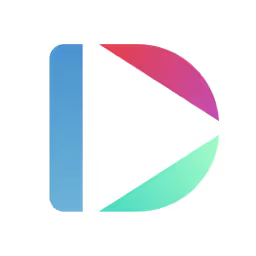YouCanBook.Me Alternatives
A detailed comparison of 10 YouCanBook.Me alternatives. We analyze features, pricing, and integrations to help you choose the right tool.
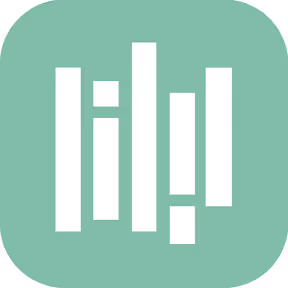
YouCanBook.Me is a solid choice for many, and for good reason. It excels at the basics: setting up a simple booking page and connecting your calendar. If you just need to manage one-on-one meetings, it gets the job done effectively.
But it has limits. Some users find the customization options restrictive, while others report occasional calendar sync problems. We've analyzed top alternatives based on G2 reviews to help you find a better fit for your needs. Let's get started.
For Sales Automation, Consider 11x
Teams that explore digital workers for sales may find 11x relevant. It provides autonomous agents to handle specific sales activities. This approach can support your sales operations and goals.
At 11x, we provide a GTM platform where AI agents manage the sales process. Our agent, Alice, finds prospects, conducts outreach on email and LinkedIn, and keeps your CRM current.
Another agent, Julian, qualifies inbound leads and books meetings. The platform unifies tools for data enrichment, outreach, and email warmup, so you do not need separate solutions.
YouCanBook.Me Alternatives
Below, we review several alternatives to YouCanBook.Me. Each review covers pricing, main features, and how they compare in terms of advantages and potential drawbacks.
1) Calendly
Calendly is a widely used scheduling tool known for its simple interface. It offers similar core functionality to YouCanBook.Me, allowing users to share availability and book meetings. The main difference often comes down to user experience and integration options.
The platform's interface is often cited for its ease of use. It provides robust integrations with various CRMs, video conferencing tools, and payment platforms. This can be a significant factor for teams that rely on a connected tech stack for their operations.
The free version of Calendly has limitations, such as allowing only one event type. Some users may also find the branding and customization options on lower-tier plans to be restrictive compared to other platforms.
Calendly is a strong option for individuals or teams who value a straightforward user experience and broad integrations. If your priority is quick setup and ease of use over deep customization, Calendly warrants consideration.
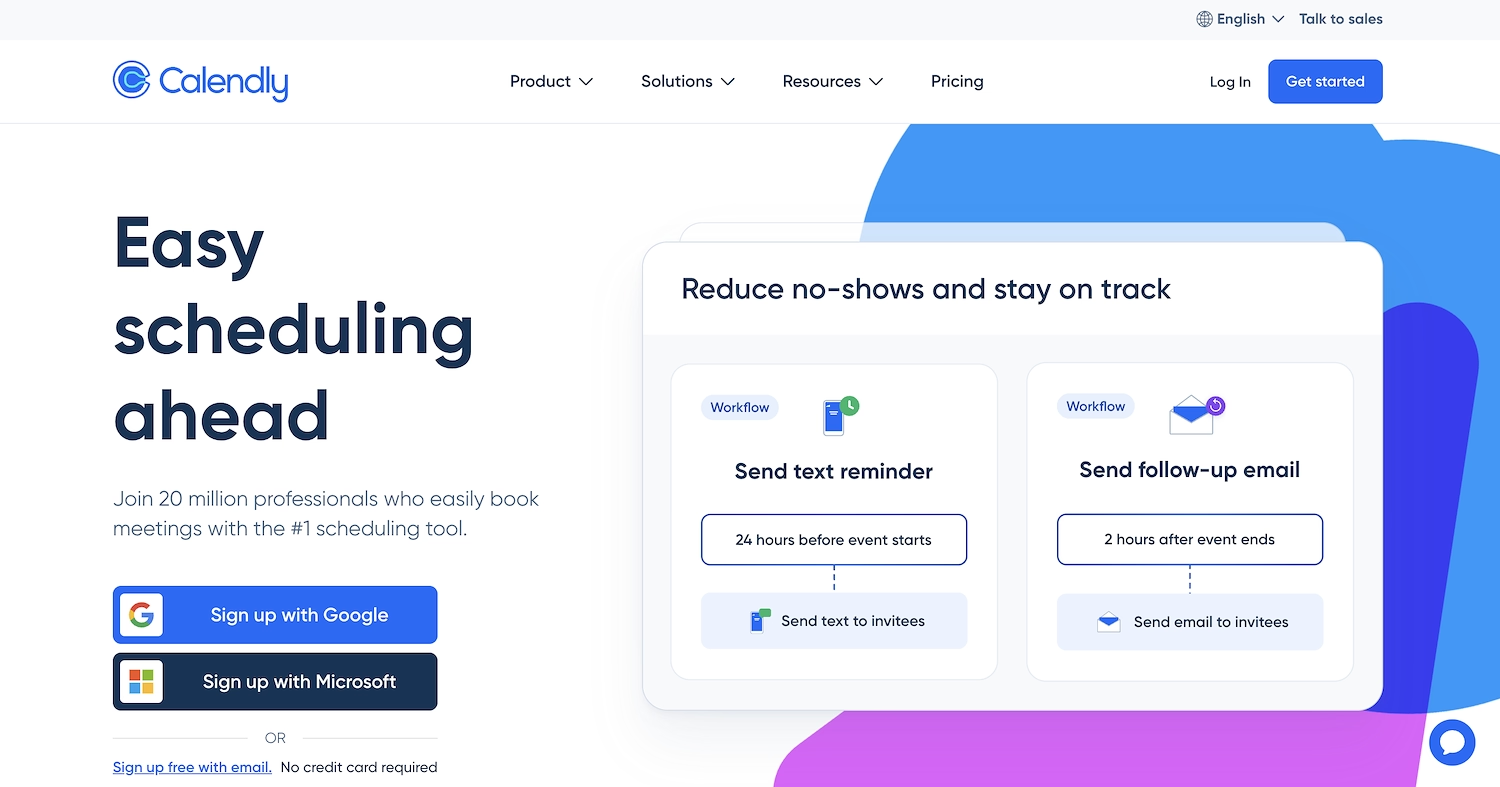
Calendly is a platform for schedule automation used by over 20 million professionals. It removes the need for back-and-forth emails. Users share real-time availability with personalized links or embedded calendar widgets. The tool connects with multiple calendars and over 100 business applications.
Common uses include sales lead qualification, recruitment interviews, and customer success check-ins. The platform also automates reminders and follow-ups to help reduce no-shows.
Calendly's Main Features
- Automates lead qualification and routing directly from a website before presenting booking options.
- Supports team scheduling with round-robin and collective event types to pool availability or co-host meetings.
- Offers centralized administration with controls for user provisioning, security settings, and access to usage reports.
- Integrates with browsers and email clients to insert scheduling links directly within Gmail, LinkedIn, and CRMs.
How Calendly Compares To YouCanBook.Me
Average Review Score: 4.7/5 stars based on 2,399 G2 reviews.
- Calendly offers automated lead qualification and routing directly from a website, which helps manage inbound interest before booking. This differs from YouCanBook.Me's more direct approach to scheduling.
- The tool supports complex team scheduling with round-robin and collective event types. This provides more ways to manage team availability compared to YouCanBook.Me's scheduling options.
- It integrates with over 100 business applications, including various CRMs and payment platforms. This offers a more connected tech stack compared to the integration options available with YouCanBook.Me.
- The platform includes centralized administration controls for managing user permissions and security settings. This is particularly useful for larger teams requiring oversight, a feature that is more developed than in YouCanBook.Me.
Calendly's Potential Drawbacks
- Calendly provides limited customization on its free plan compared to YouCanBook.Me. For example, users have less control over the booking page design, which can be a drawback for businesses that want a more branded experience without a paid subscription.
- The tool's booking forms do not support conditional logic. This means all users see the same questions. YouCanBook.Me, in contrast, allows you to create dynamic forms that change based on the answers provided, which helps gather more relevant information.
- Some users report that Calendly requires manual time blocking for certain events. This is different from YouCanBook.Me, which automatically checks all connected calendars for busy times to prevent any double bookings without manual adjustments.
Pricing and Plan Comparison
Calendly offers a free plan, with paid options at $10 per seat for its Standard plan and $16 for its Teams plan. Since YouCanBook.Me uses a different pricing model, a direct cost comparison requires evaluating the costs based on your specific team size and needs.
2) Acuity Scheduling
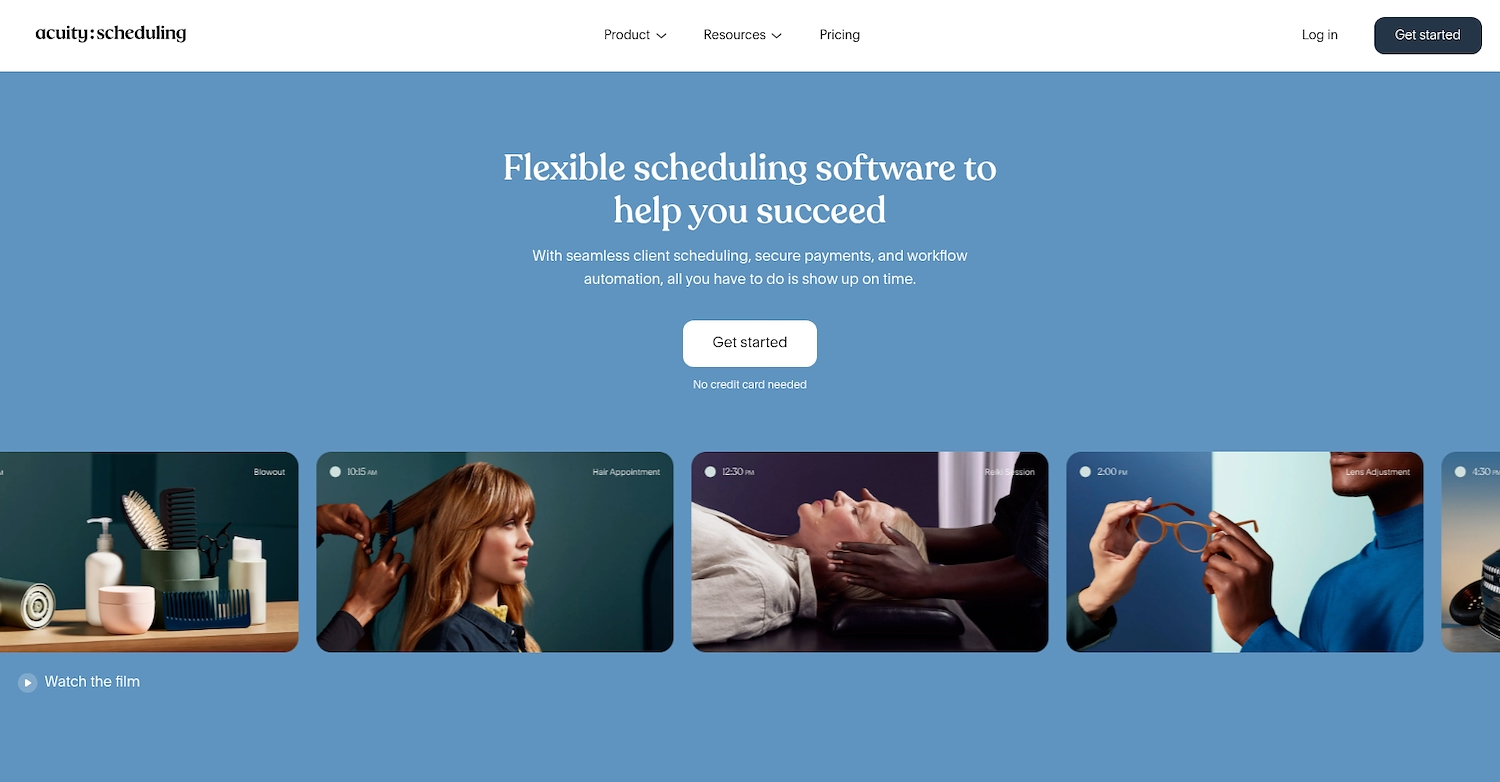
Acuity Scheduling, a Squarespace company, is a platform for service businesses to automate client appointments. It provides a branded page for clients to self-schedule, pay, and receive reminders. The system helps reduce administrative work and limit no-shows through deposits and clear policies.
It also supports recurring revenue with subscriptions and packages. Users can manage staff and locations from one dashboard and collect detailed client information through intake forms.
Acuity Scheduling's Main Features
- Offers loyalty-building tools such as coupons, discounts, subscriptions, gift cards, and packages to encourage repeat business.
- Supports secure payment collection through Stripe, Square, and PayPal, with options for deposits, tipping, and checkout add-ons.
- Provides built-in HIPAA compliance on its premium plan for businesses that handle protected health information.
- Includes custom intake forms to collect detailed client information and store it in client profiles for personalized service.
How Acuity Scheduling Compares To YouCanBook.Me
Average Review Score: 4.7/5 stars based on 404 G2 reviews.
- Acuity Scheduling includes advanced commerce tools like subscriptions, packages, and gift cards. This provides more ways to generate revenue compared to YouCanBook.Me, which focuses on appointment booking.
- It offers detailed intake forms to build client profiles for personalized service. This differs from YouCanBook.Me, where forms primarily gather basic meeting information.
- The platform provides built-in HIPAA compliance on its premium plan. This makes it a suitable option for businesses that handle protected health information, a feature not offered by YouCanBook.Me.
- This tool supports multiple staff members and locations within its plans. This offers more flexibility for growing service businesses than YouCanBook.Me's structure, which is often better for individuals.
Acuity Scheduling's Potential Drawbacks
- Some users report calendar sync issues, which may cause scheduling conflicts. In comparison, YouCanBook.Me provides a consistent two-way sync across all connected calendars to help prevent double bookings.
- Its intake forms do not support conditional logic, so all clients see the same questions. This differs from YouCanBook.Me, which allows dynamic forms that adapt based on previous answers to gather more specific information.
- Unlike YouCanBook.Me, Acuity Scheduling does not have a free plan. This might be a consideration for individuals or small teams who need a basic scheduling tool without a monthly subscription.
Pricing and Plan Comparison
Acuity Scheduling's paid plans start at $16 per month and it does not offer a free option, while YouCanBook.Me provides a free tier. This makes YouCanBook.Me more accessible for individuals, whereas Acuity's model is built for service businesses. For detailed pricing, visit Acuity Scheduling's official website.
3) Doodle
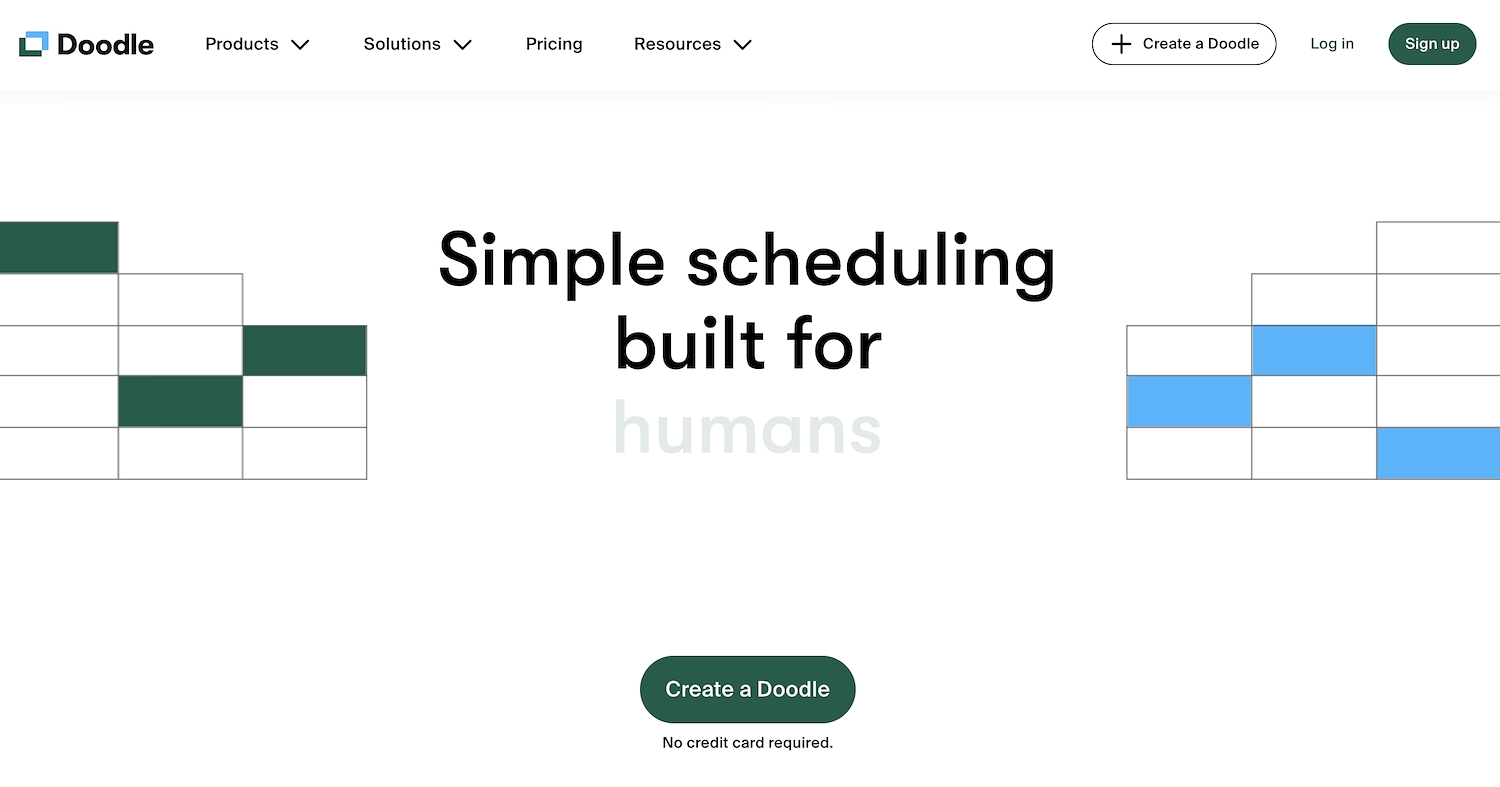
Doodle is a scheduling platform to set up meetings. Users create invitations or booking pages so participants can select a time. The service supports individuals, teams, and enterprises. Use cases include recruitment, board meetings, and sales calls.
The platform offers different schedule methods, such as group polls and one-on-one booking pages. It focuses on quick setup and provides enterprise-level security for company-wide deployment.
Doodle's Main Features
- Offers multiple scheduling workflows, including group polls to find the best time for everyone and sign-up sheets for events.
- Allows people to claim available slots for workshops, webinars, or other events through a sign-up sheet feature.
- Collects payments at the time of booking through an integration with Stripe.
- Automatically creates calendar events and adds video conference links for Zoom, Microsoft Teams, and Google Meet.
How Doodle Compares To YouCanBook.Me
Average Review Score: 4.4/5 stars based on 2,064 G2 reviews.
- Doodle uses group polls to find a common time for many people to meet. This approach is different from YouCanBook.Me, which provides a booking page for one person to schedule a time.
- The platform offers a sign-up sheet feature for events, where multiple people can claim a spot. YouCanBook.Me is structured for individual appointments rather than group event sign-ups.
- It provides multiple ways to schedule, such as polls for groups and booking pages for individuals. This offers more flexibility compared to YouCanBook.Me's focus on a single type of booking page.
- With Doodle's polls, participants can often see what times others have chosen. This helps groups find the best time together, unlike YouCanBook.Me where a person just picks an empty slot from a calendar.
Doodle’s Limitations Compared To YouCanBook.Me
- Some users report issues with Doodle's calendar sync, which can cause scheduling conflicts. In contrast, YouCanBook.Me provides a consistent two-way sync that helps prevent double bookings across all calendars.
- Doodle's booking forms do not support conditional logic, so all clients see the same questions. YouCanBook.Me, however, has dynamic forms that adapt based on previous answers to collect more specific information.
- The tool provides limited branding options on its free plan. Compared to Doodle, YouCanBook.Me gives users more control over the booking page design, which allows for a more branded look without a paid plan.
Pricing and Plan Comparison
Both Doodle and YouCanBook.Me offer a free plan. Doodle's paid plans start at $6.95 per user annually, offering a predictable cost structure, whereas YouCanBook.Me uses a different model that varies with team size. For detailed pricing, check Doodle's official website.
4) SimplyBook.me
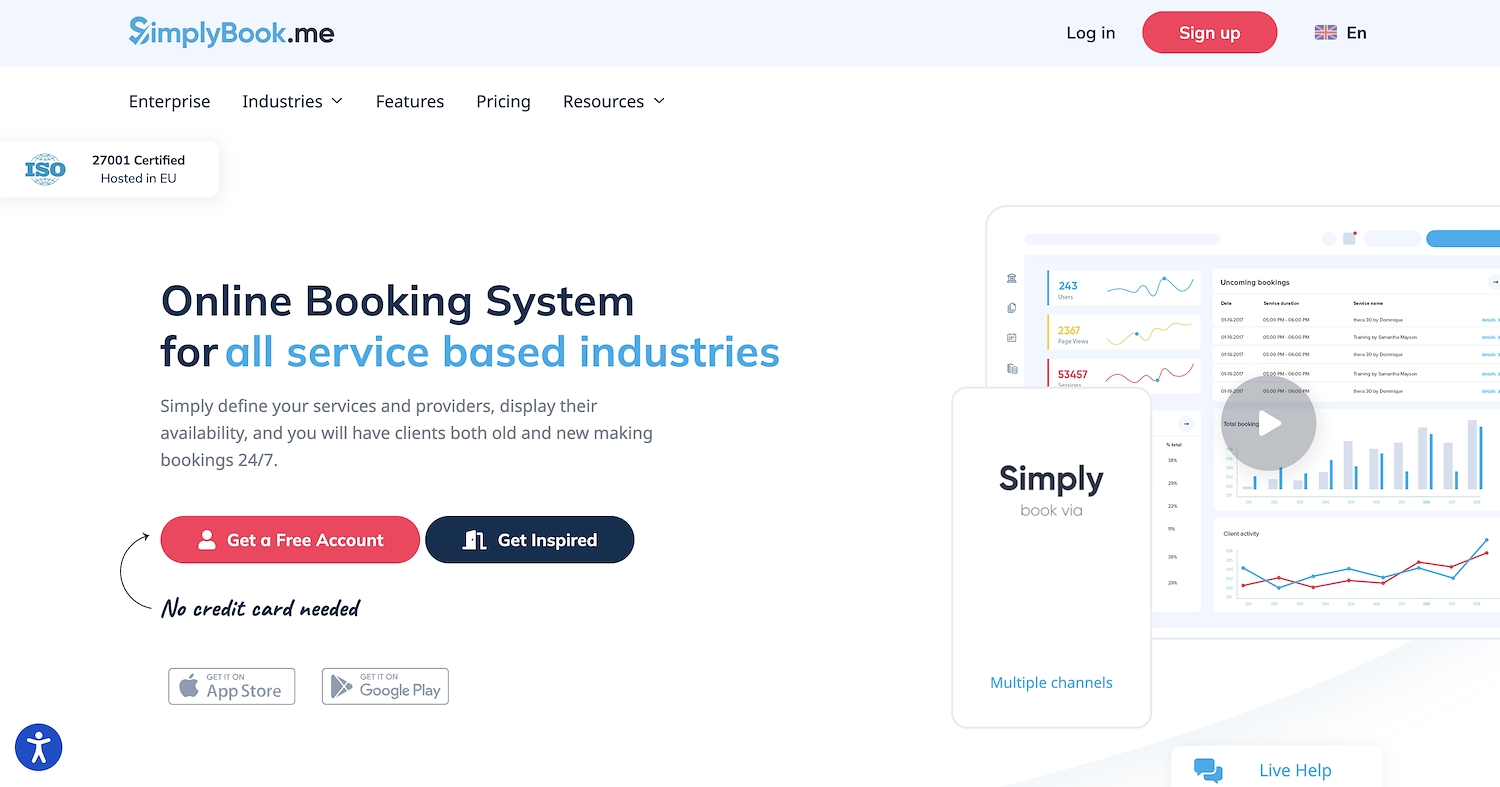
SimplyBook.me is a booking system for service-based industries. It provides a booking website or a widget for integration into existing sites. The platform manages appointments, accepts payments, and sends client notifications. It serves various sectors, including medical clinics, educational institutions, consultants, and government agencies.
SimplyBook.me's Main Features
- Offers omnichannel booking through a website, widgets, social media channels, and a branded client app.
- Accepts online and in-store payments via Stripe, PayPal, POS systems, QR codes, and Tap & Pay.
- Includes a built-in marketing suite to schedule posts and launch ads on Google, Meta, and TikTok.
- Provides over 50 custom features, including a loyalty system, memberships, packages, and product sales with add-ons.
How SimplyBook.me Compares To YouCanBook.Me
Average Review Score: 4.4/5 stars based on 105 G2 reviews.
- SimplyBook.me provides omnichannel booking options, including a branded client app and social media integration. This offers more ways for clients to book compared to YouCanBook.Me's primary focus on a web-based booking page.
- The platform includes a built-in marketing suite for promotions and ads. This is a more direct approach to marketing than YouCanBook.Me, which relies on integrations for similar functions.
- It supports selling products, memberships, and gift cards directly through the booking page. This adds a revenue stream that is not available with YouCanBook.Me's scheduling-focused system.
- This tool accepts a wider range of payment methods, including POS systems and QR codes for in-person transactions. YouCanBook.Me's payment options are generally limited to online payments for appointments.
SimplyBook.me’s Potential Drawbacks
- Some users report that SimplyBook.me has a steeper learning curve due to its many features. In comparison, YouCanBook.Me offers a more direct setup process for users who just need a simple booking page.
- Its intake forms do not support conditional logic, so all clients see the same set of questions. YouCanBook.Me, however, provides dynamic forms that adapt based on previous answers to gather more specific information.
- The platform's interface can seem complex because it includes tools for marketing and product sales. YouCanBook.Me has a simpler design as it focuses only on the core function of booking appointments.
Pricing and Plan Comparison
Both platforms provide a free plan. SimplyBook.me offers paid tiers with fixed costs starting at $9.90 per month. In contrast, YouCanBook.Me uses a variable pricing model based on the number of connected calendars, which may offer different cost benefits depending on team size.
5) Setmore
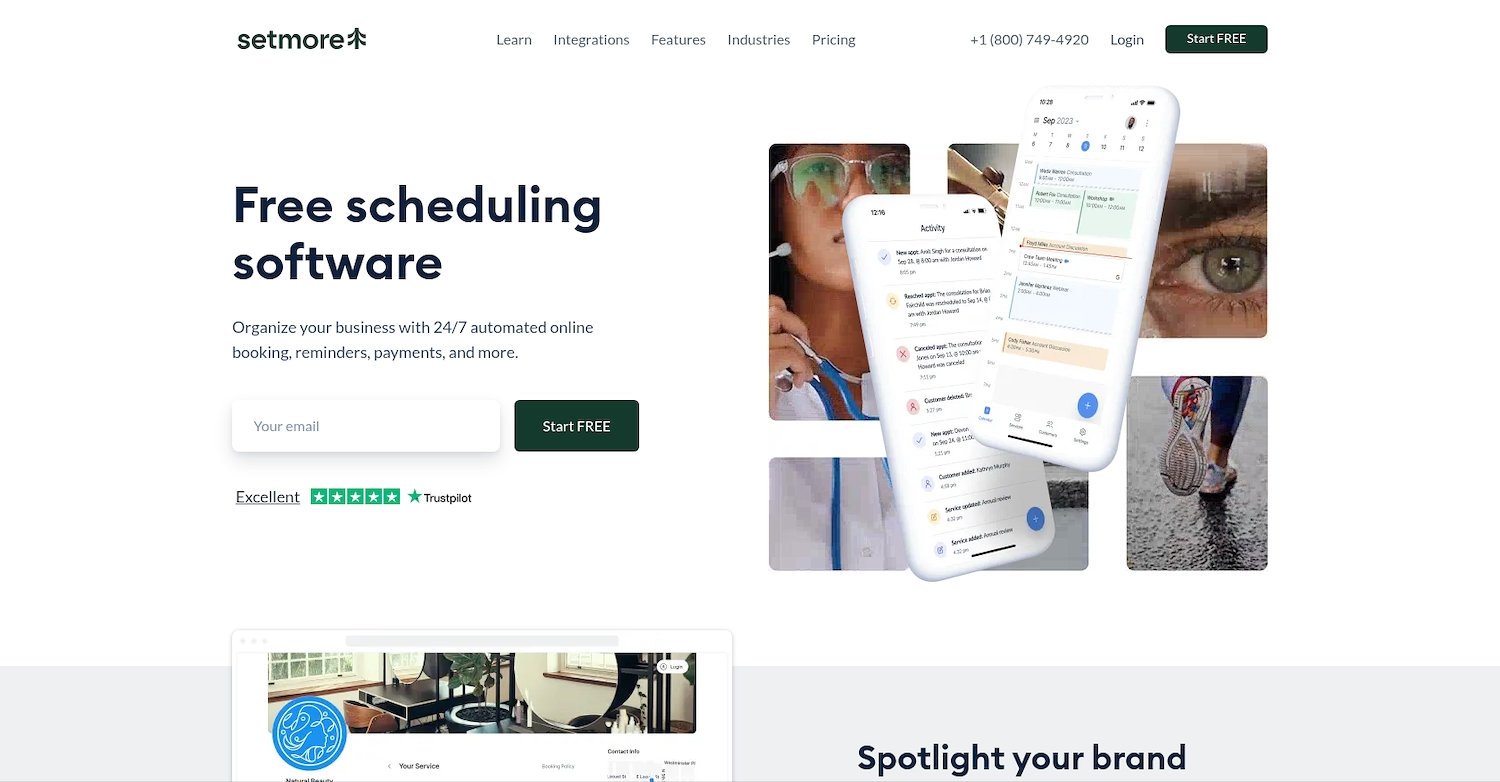
Setmore is an appointment schedule platform for businesses. It provides a public page for clients to make appointments online. The system accepts payments and sends automatic reminders. The tool is for service providers in retail, beauty, and health, and for consultants who manage a client calendar.
Setmore's Main Features
- Offers a custom booking page that displays services, an Instagram feed, and reviews.
- Generates a QR code that opens the booking page from printed or digital materials.
- Embeds booking widgets on websites, Facebook, and Instagram for on-page scheduling.
- Accepts payments through Stripe, Square, and PayPal, with support for Tap to Pay.
How Setmore Compares To YouCanBook.Me
Average Review Score: 4.5/5 stars based on 267 G2 reviews.
- Setmore provides a QR code that links directly to the booking page for use on physical marketing materials. This offers an offline-to-online booking channel not present in YouCanBook.Me.
- The tool integrates with Facebook and Instagram to add a 'Book Now' button directly on social profiles. This is different from YouCanBook.Me, which primarily uses embeddable widgets on websites.
- It offers a HIPAA-compliant version for businesses that handle protected health information. YouCanBook.Me does not provide this level of data security for healthcare providers.
- With Setmore, you can display your Instagram feed and customer reviews on the booking page. This provides more social proof compared to the customization options available on YouCanBook.Me's pages.
Setmore’s Potential Drawbacks
- Setmore does not support conditional logic in its booking forms, so all clients see the same questions. YouCanBook.Me, in contrast, allows forms that change based on previous answers, which helps gather more specific information from clients before a meeting.
- Some users report that the tool offers limited control over the advance-booking window. This is different from YouCanBook.Me, which provides more detailed settings for how far in advance clients can book appointments and for setting specific availability per day.
- A few reviews mention that Setmore can sometimes have backend bugs or integration issues. YouCanBook.Me, by comparison, is often noted for its reliable two-way calendar sync that helps prevent double bookings without manual checks.
Pricing and Plan Comparison
Both platforms provide a free plan. Setmore offers paid tiers with fixed costs starting at $9 per month, making it predictable for teams. YouCanBook.Me’s pricing is variable and depends on the number of connected calendars, so costs scale with use.
Automate Sales Activities with 11x
If you want to use digital workers for sales, 11x offers a GTM platform with AI agents. These agents manage the sales process, from prospect discovery to meeting coordination. See how 11x can support your sales operations.
With 11x, we run your sales playbook using AI agents. Our agent Alice identifies accounts and starts outreach, while Julian qualifies leads and books meetings. Our platform unifies data, outreach, and warmup tools, so you do not need separate solutions.
Book a demo to see 11x in action.
6) OnceHub
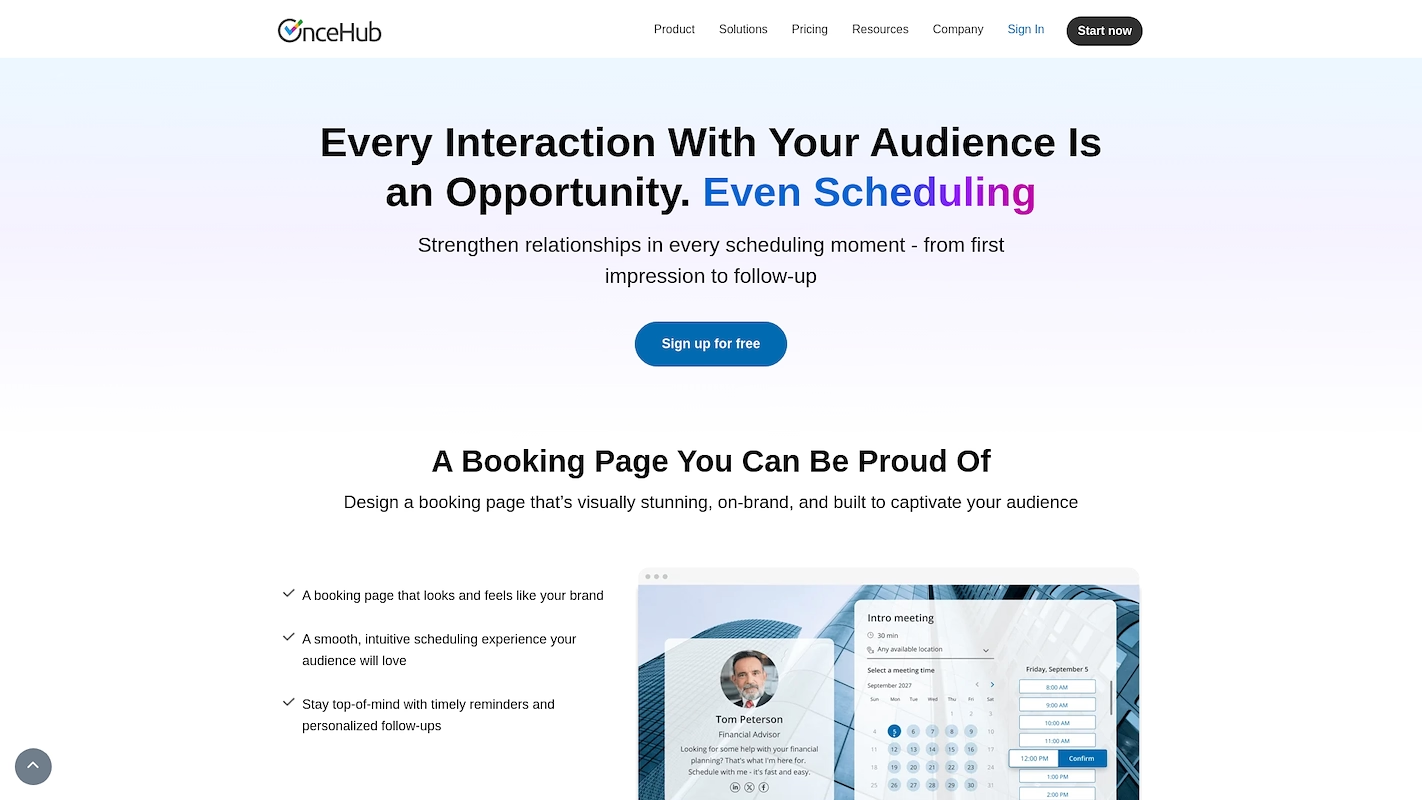
OnceHub is a platform for appointment management. Businesses use it to coordinate meetings with customers and between internal teams. The tool is an option for companies that want to automate the process to book calls and events.
OnceHub's Main Features
- Uses AI-driven conversational scheduling to assess a meeting's urgency and purpose before booking.
- Provides smart routing and distribution rules to match inquiries with the correct team member or calendar.
- Supports multi-location and hybrid work by combining calendars and coordinating meeting rooms.
- Offers enterprise-grade security with compliance for GDPR, HIPAA, SOC2, and PCI DSS.
How OnceHub Compares To YouCanBook.Me
Average Review Score: 4.3/5 stars based on 52 G2 reviews.
- OnceHub uses AI-driven conversational scheduling to qualify leads before booking. This provides more context than YouCanBook.Me's direct form-based scheduling.
- The tool includes smart routing rules that automatically assign inquiries to the correct team member. This offers more advanced distribution than YouCanBook.Me's team scheduling options.
- It provides enterprise-grade security with compliance for HIPAA and SOC2. This level of security is suitable for regulated industries, a feature not available in YouCanBook.Me.
- This platform supports hybrid work by managing meeting room reservations alongside personal calendars. YouCanBook.Me focuses on scheduling people's time rather than physical resources.
OnceHub’s Limitations Compared To YouCanBook.Me
- Some users report that OnceHub has a steeper learning curve due to its many features. In comparison, YouCanBook.Me provides a more direct setup process for users who need a simple booking page.
- The tool's booking forms do not support conditional logic, so all clients see the same questions. YouCanBook.Me, however, allows dynamic forms that adapt based on previous answers to gather more specific information.
- It provides fewer customization options for its booking pages. YouCanBook.Me offers more control over the design, which helps businesses create a more branded experience, even on its free plan.
Pricing and Plan Comparison
Both platforms offer a free plan, with OnceHub's supporting up to three users. OnceHub's paid plan starts at $10 per user per month, while YouCanBook.Me uses a variable model where costs scale with the number of connected calendars. For detailed pricing, visit OnceHub's official website.
7) Appointlet
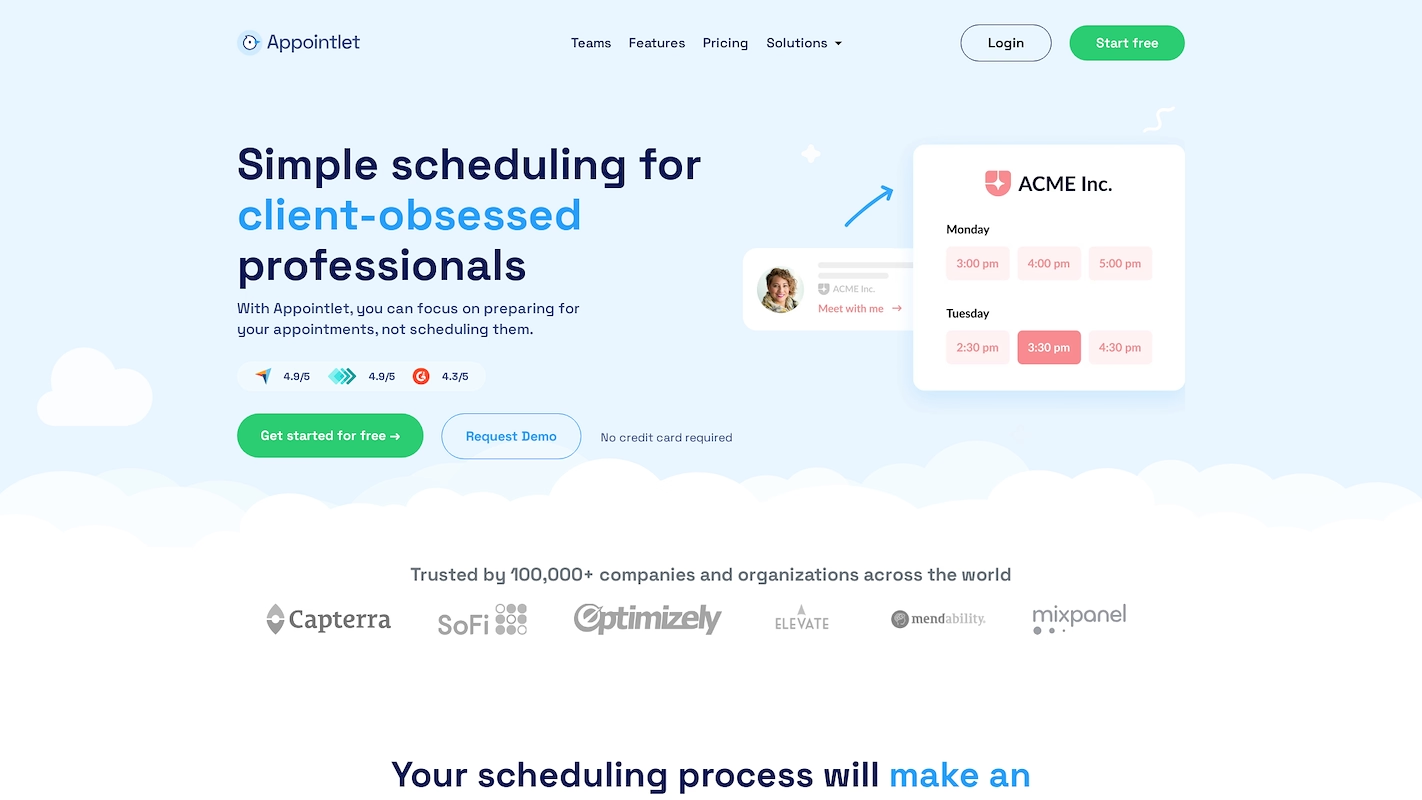
Appointlet is a web-based tool for appointment scheduling. Businesses create a booking page for clients to view availability and select a meeting time. The platform is used by teams in sales, customer success, and recruitment to organize calls and consultations with external contacts.
Appointlet's Main Features
- Allows customization of booking pages with brand colors, logos, welcome text, and intake forms.
- Sends automated calendar invites, email and SMS reminders, and handles rescheduling or cancellations.
- Supports team scheduling with round-robin, client-choice, or multi-attendee bookings across staff members.
- Provides multiple sharing methods, including an embeddable widget for inline or pop-up display on a webpage.
How Appointlet Compares To YouCanBook.Me
Average Review Score: 4.4/5 stars based on 15 G2 reviews.
- Appointlet supports multiple team scheduling modes, including round-robin and multi-attendee bookings. This gives teams more ways to manage group appointments compared to YouCanBook.Me's standard team scheduling.
- The tool allows for detailed customization of booking pages with brand colors, logos, and custom text. This provides more branding flexibility compared to YouCanBook.Me, which has more restrictive design options.
- Its booking widget can be embedded as a pop-up on a website. This offers an alternative way for clients to schedule, which differs from YouCanBook.Me's typical inline embedding method.
- The premium plan has a fixed cost per user, which makes budgeting more predictable for teams. This is different from YouCanBook.Me's variable pricing model that scales with the number of connected calendars.
Appointlet’s Limitations Compared To YouCanBook.Me
- Appointlet does not support conditional logic in its booking forms, so all clients see the same questions. YouCanBook.Me, in contrast, allows for dynamic forms that adapt based on previous answers to gather more specific information.
- Some users mention that the platform can have occasional technical issues. This is different from YouCanBook.Me, which is often noted for its reliable two-way calendar sync that helps prevent double bookings.
- The tool's free plan has more limitations on features and branding. In comparison, YouCanBook.Me provides greater control over the booking page design on its free tier, which offers a more branded experience without a subscription.
Pricing and Plan Comparison
Both tools offer a free plan. Appointlet's paid plan is a fixed $8 per member per month, offering predictable costs for teams. In contrast, YouCanBook.Me's pricing is variable and scales with the number of connected calendars, not users.
8) 10to8
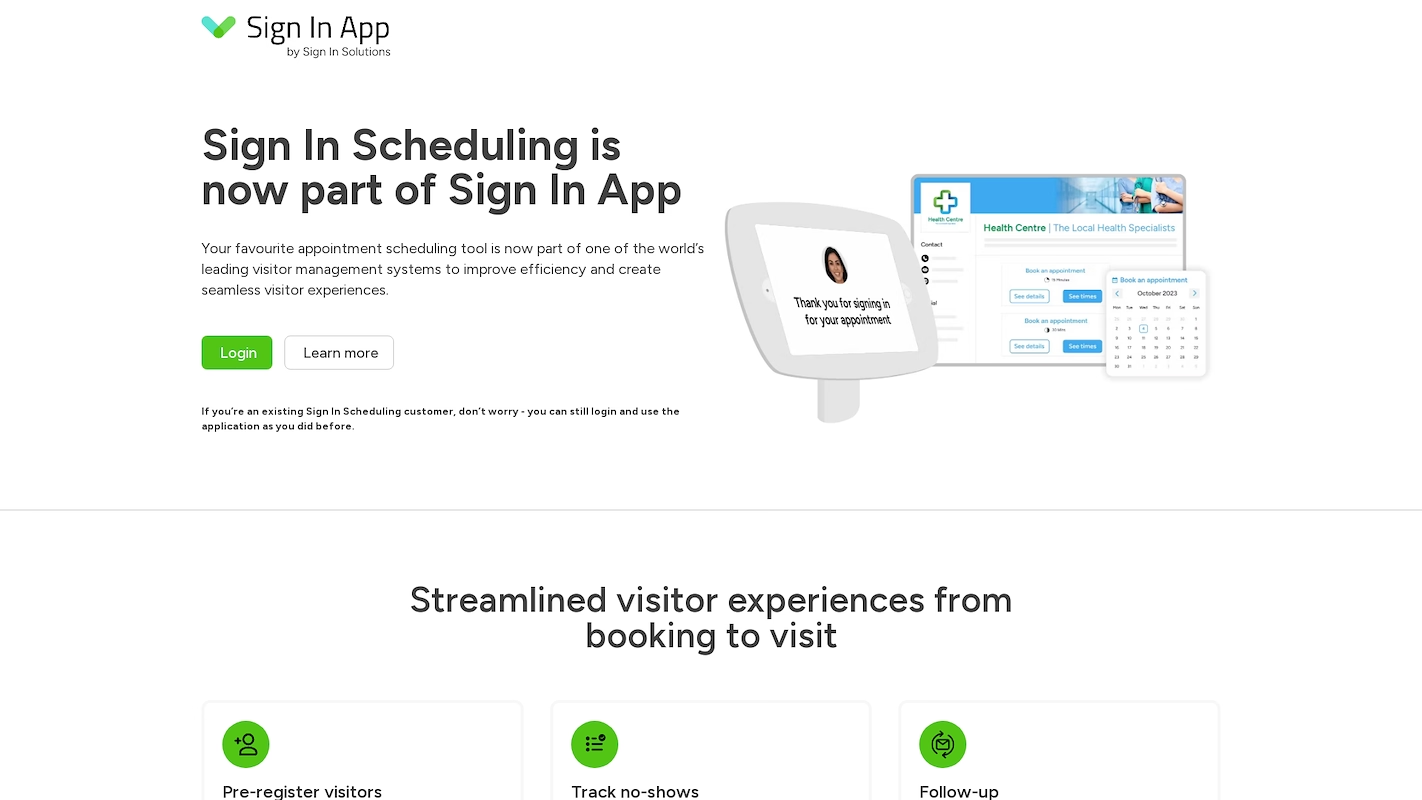
10to8 is an appointment scheduling platform that provides businesses with a booking page for clients. People can book appointments online based on real-time availability. The tool is for service providers and teams that need to coordinate meetings with external contacts and automate parts of the scheduling process.
10to8's Main Features
- Offers customizable booking workflows to suit various business requirements.
- Integrates with calendars and video conferencing tools like Zoom.
- Sends automated reminders to clients to save time and reduce no-shows.
How 10to8 Compares To YouCanBook.Me
Average Review Score: 4.6/5 stars based on 221 G2 reviews.
- 10to8 lets you collect signed NDAs and share policies when a client books, which provides more compliance options than YouCanBook.Me's standard forms.
- The platform also handles booking for physical resources like meeting rooms. This is a feature not found in YouCanBook.Me, which focuses on personal availability.
- It includes a companion app for staff to manage schedules on the go. YouCanBook.Me, in comparison, is managed mainly through its web dashboard.
- This tool provides 24/5 live chat support for users who need help. This level of support is different from the standard options offered by YouCanBook.Me.
10to8’s Limitations Compared To YouCanBook.Me
- The platform's intake forms do not use conditional logic, so all clients answer the same questions. This is different from YouCanBook.Me, which lets you create dynamic forms that change based on a client's responses.
- Some reviews note occasional calendar sync problems, which could result in scheduling conflicts. YouCanBook.Me, by comparison, provides a consistent two-way sync that helps avoid double bookings without manual checks.
- Its pricing structure is geared toward larger sites with a higher starting cost. This is less flexible than YouCanBook.Me's model, which scales based on the number of calendars and includes a free tier for basic needs.
Pricing and Plan Comparison
10to8's pricing starts at $495 per site annually, making it a considerable investment for larger organizations. In contrast, YouCanBook.Me is more accessible with a free plan and a variable cost that scales with the number of calendars, which is better for individuals or small teams.
9) Bookafy
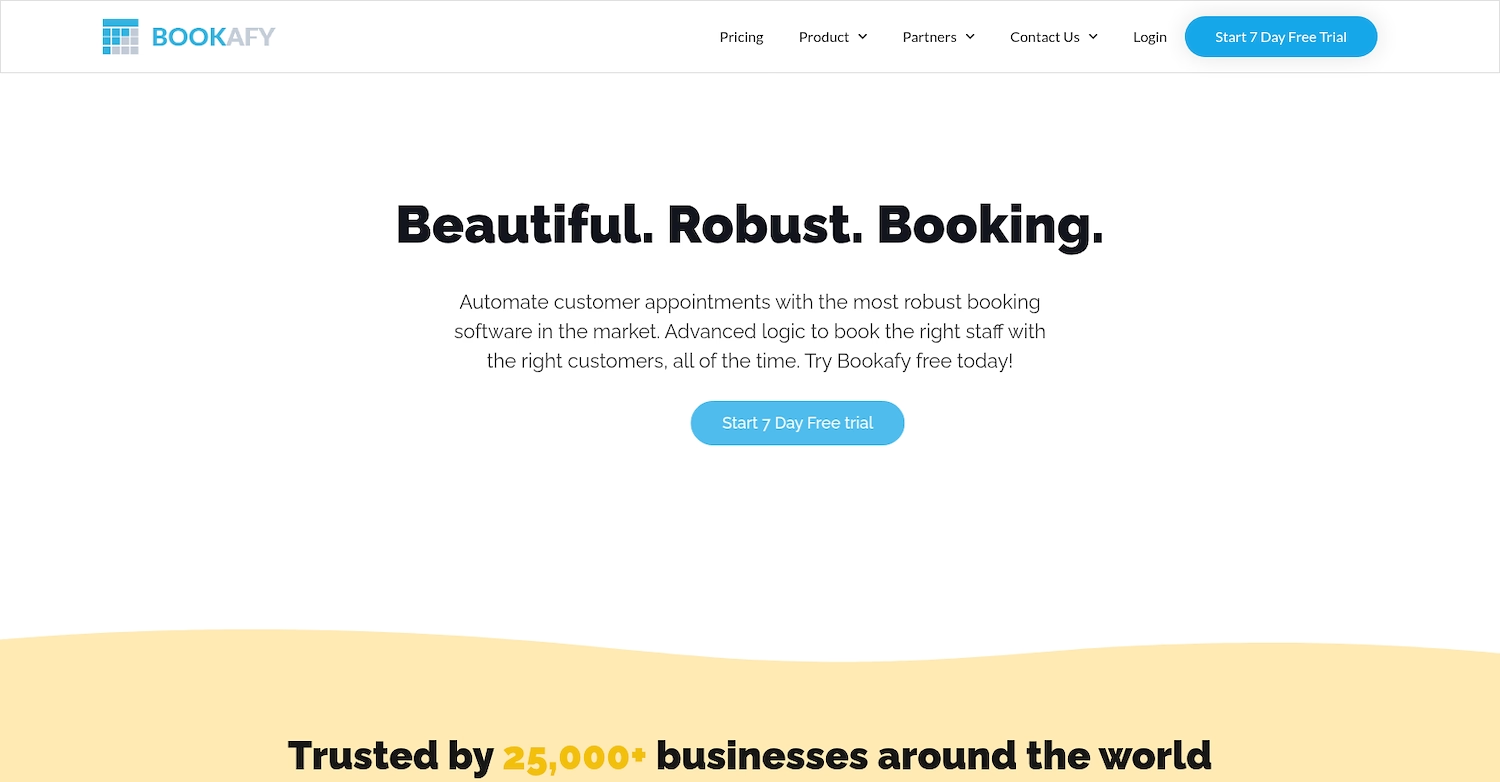
Bookafy is an appointment schedule software that provides a booking page for customers to book appointments 24/7. Businesses use it for sales demos, interviews, and customer support calls. The tool automates the appointment process and helps teams coordinate with external contacts.
Bookafy's Main Features
- Embeds into websites via iframe and pop-up, with options to customize color, font, and lines to match a brand.
- Integrates with Exchange, Outlook, and iCloud calendars, CRMs like Salesforce and Zoho, and video tools such as Zoom and GoToMeeting.
- Offers custom UI and integration work for enterprise clients.
- Provides live support through phone and video calls to walk users through setup and questions.
How Bookafy Compares To YouCanBook.Me
Average Review Score: 4.4/5 stars based on 14 G2 reviews.
- Bookafy provides more design options for its booking page, including custom colors, fonts, and lines. This offers more brand alignment compared to the design settings available in YouCanBook.Me.
- It integrates with a wider range of calendars, such as Exchange and iCloud. This is different from YouCanBook.Me, which focuses primarily on Google and Microsoft 365 calendars.
- The tool offers live support through phone and video calls to assist with setup. This provides a more hands-on support experience than the standard options from YouCanBook.Me.
- For enterprise clients, Bookafy provides custom UI and integration work. This service is not a standard offering with YouCanBook.Me, which is built as a self-service platform.
Bookafy’s Limitations Compared To YouCanBook.Me
- The platform's intake forms are static, meaning every client answers the same set of questions. This differs from YouCanBook.Me, which uses conditional logic to create dynamic forms that collect more targeted information based on a client's responses.
- Some users report that the tool's configuration can feel confusing. This is different from YouCanBook.Me, which offers a more straightforward setup process for users who need to create a simple booking page quickly.
- Its mobile calendar view is limited to a daily agenda, which can make it difficult to see future availability. YouCanBook.Me provides a more complete mobile experience with multiple calendar views for easier schedule management.
Pricing and Plan Comparison
Both platforms offer a free plan. Bookafy provides fixed-tier pricing with its Pro plan at $7 per month and Enterprise at $11 per month, offering predictable costs. In contrast, YouCanBook.Me uses a variable model where the price scales based on the number of connected calendars.
10) TimeTap
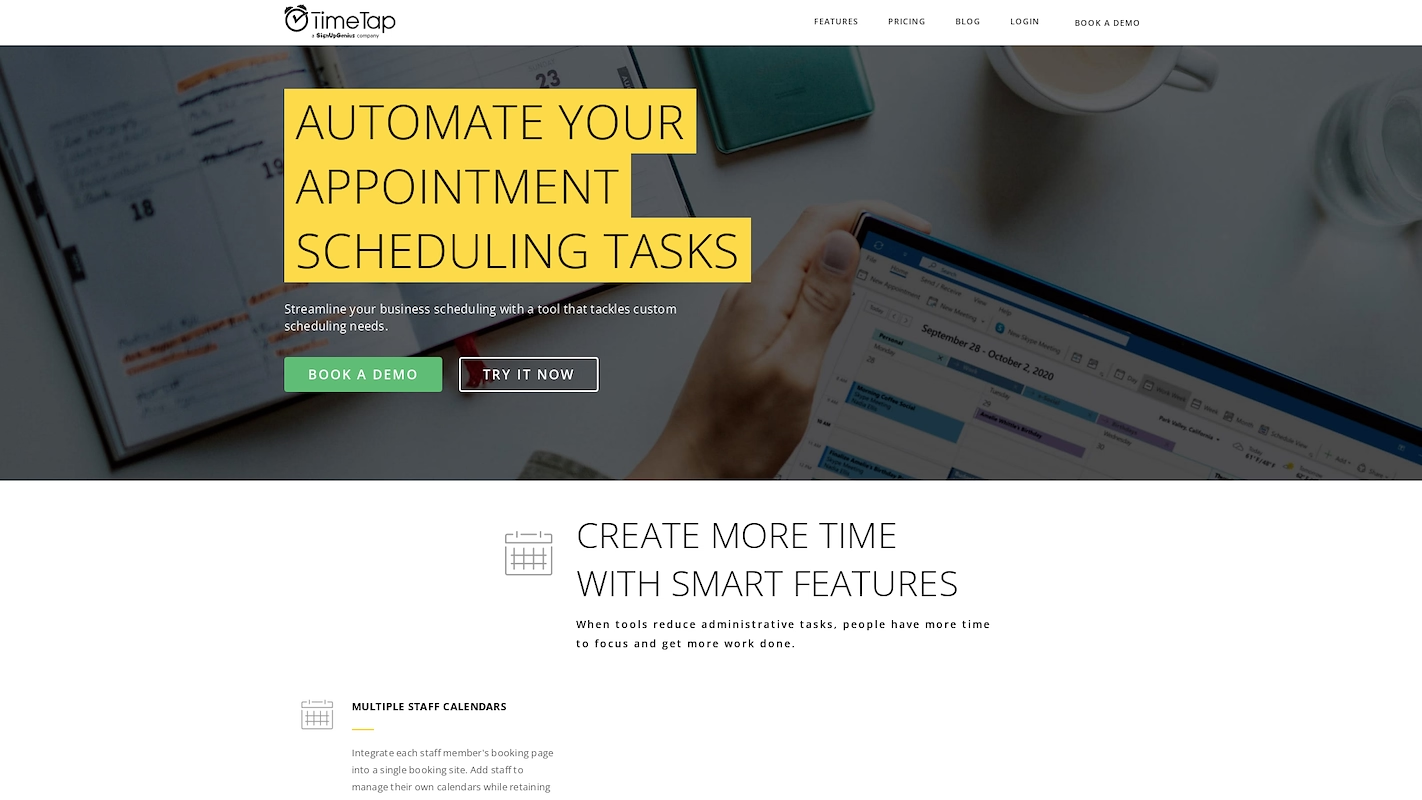
TimeTap is an appointment scheduling platform for service-based businesses. It provides a booking page for clients to make appointments from any device. The system is built to handle multiple staff members, locations, and services. Companies use it to coordinate appointments for consultations, classes, and other professional events.
TimeTap's Main Features
- Allows the setup of repeating appointments without requiring manual entry for each event.
- Manages bookings across multiple locations, which is suitable for businesses with several branches.
- Uses screening questions to qualify bookings or registrations directly on the scheduling page.
- Offers HIPAA, GDPR, and SOC2 compliance for secure handling of appointment and client data.
How TimeTap Compares To YouCanBook.Me
Average Review Score: 4.4/5 stars based on 95 G2 reviews.
- TimeTap allows you to set up repeating appointments for clients. This is different from YouCanBook.Me, which is designed for scheduling single, non-recurring meetings.
- It supports businesses with multiple locations by managing bookings across different branches from one system. YouCanBook.Me's structure is more suited for single-location businesses or individuals.
- The tool uses screening questions to qualify clients before they book a time. This provides a layer of vetting that is not a standard feature in YouCanBook.Me's booking process.
- This platform offers HIPAA, GDPR, and SOC2 compliance for secure data handling. This level of security is not available with YouCanBook.Me, making TimeTap an option for regulated industries.
TimeTap’s Limitations Compared To YouCanBook.Me
- TimeTap uses static intake forms, so all clients see the same questions. This is different from YouCanBook.Me, which allows dynamic forms that change based on a client's answers to collect more specific information.
- The tool provides fewer options to customize the booking page design. In comparison, YouCanBook.Me offers more control over branding elements, which helps businesses create a look that matches their website.
- Some users find its mobile interface difficult to navigate for scheduling. YouCanBook.Me, in contrast, provides a mobile view with multiple calendar options that makes it easier to manage availability on the go.
Pricing and Plan Comparison
YouCanBook.Me offers a free plan, while TimeTap's paid options start at $28.45 per month for a solo user. TimeTap uses fixed pricing tiers for individuals and teams, making costs predictable. In contrast, YouCanBook.Me's pricing is variable and scales with the number of connected calendars, not users.
Which One Should You Go With?
Many variables factor into choosing a YouCanBook.Me alternative, from team size to required features. This guide shared several options with detailed comparisons to help you decide which platform best fits your operational needs.
If your focus is on automating sales activities rather than just scheduling, 11x provides a GTM platform with AI agents. These agents manage tasks from prospecting to booking meetings, offering a different approach to supporting your sales team and goals.




